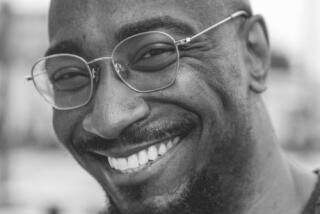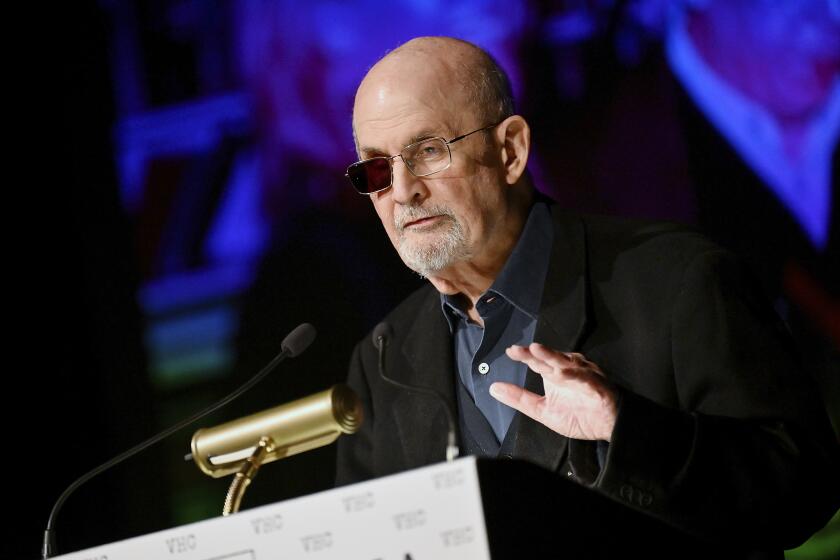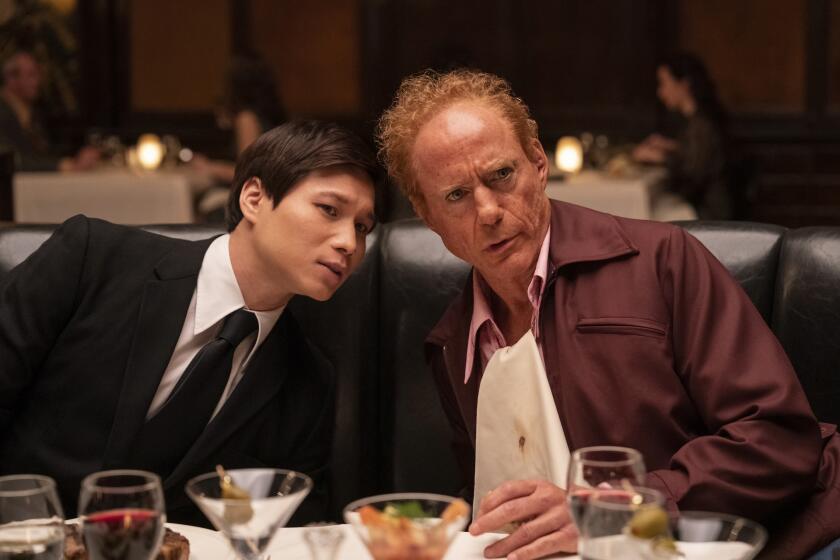Talking with Karen E. Bender about ‘A Town of Empty Rooms’
Karen E. Bender’s second novel, “A Town of Empty Rooms,” (Counterpoint: 292 pp., $25) is a story of divisions, in both a marriage and a community. Revolving around Dan and Serena Shine, a couple who move, with their two young children, from Manhattan to rural North Carolina, it traces a culture clash that takes place as much in the family room as it does in the street. The Shines are, if not estranged, then distant, harboring resentments and old hurts. These play out in unexpected ways after Serena connects with her Jewish roots at a local synagogue while Dan becomes involved with their next door neighbor, an elderly conservative.
Bender, who grew up in Los Angeles (her sister is the writer Aimee Bender), is the author of one previous novel, “Like Normal People,” and co-editor of “Choice: True Stories of Birth, Contraception, Infertility, Adoption, Single Parenthood, & Abortion.” Recently, we corresponded, via email, about her new book.
“A Town of Empty Rooms” takes place in 2002, a heightened moment in America. Why did you set it then?
2002 was a time when it felt to me like the nation was spinning out of control. The nation was in an intense state of paranoia and fear after Sept. 11, and with Bush, with the Patriot Act, with the decision to invade Iraq despite numerous protests around the globe, it felt like the government was engaged in miscommunication, or the desire not to listen, on a massive scale.
I was interested in how communication had fallen apart because I was seeing it in a more micro level in my daily life. It also seemed a good time to set the novel because of Serena’s father’s paranoia as a Jew who had left Germany right before the Holocaust. He was very distrustful of government, the ways in which it could spiral out of control, and I imagined he’d have strong reactions to the Bush administration.
The book begins in New York but quickly shifts to North Carolina. You, too, moved to North Carolina around that time.
We ended up in North Carolina in 2002, when my husband Robert and I got teaching jobs at the University of North Carolina at Wilmington. The jobs and writing community were great, but as the rest of our families were in New York and Los Angeles, we had a feeling of exile here at first. Wilmington is an odd place. It had Old South elements that we found totally perplexing (the Azalea festival, where teenage girls dressed up as antebellum belles and stood, twirling parasols, in front of houses that hosted garden tours), but the city has grown exponentially in the last 20 years, so there are a fair amount of “immigrants” from the Northeast, California, etc. drawn to the low-cost housing and easier life. We don’t feel like outsiders the way Serena and Dan do, but I don’t think we’ll ever feel like insiders either, which is good for a writer — to be poised in a place of observation, displacement, so we can absorb and reflect on what is going on around us.
Also, the experience of being Jewish in Wilmington, a Bible Belt city, was something I wanted to explore. Growing up in West Los Angeles, where Rosh Hashanah was a school holiday, I was surprised that often I was the first Jewish person someone had ever met. In fact, it was newsworthy — both of our kids have been photographed celebrating one Jewish holiday or another, for the annual newspaper article on Rosh Hashana or Hanukkah. What did it mean that this felt like an important new part of my identity? What did I have common with other Jews here?
At heart, the novel is about family — Serena’s connection to her late father; her consuming love for her kids; her estrangement from her husband Dan.
The family is the emotional landscape from which we all arise! I wanted to explore how family dynamics and longings can be projected onto communities and organizations outside a family — in this case, the way the rabbi or the neighbor Forrest become false father figures for Serena and Dan, respectively. How do we struggle with the unique nation that is our family and how do we search for it? Those are some of the issues I wanted to explore.
Serena and Dan are estranged in that quiet way of so many couples — longing for something they feel has gone missing, yet also trying to make it through.
I think marriage is a topic that could be explored so much more in fiction. Mostly we get writing about the beginning of a relationship — falling in love, etc. — or dramatic breakups, or widowhood. But what about the texture of a relationship, the ways people find ways, or don’t, to negotiate the difficult times? I like observing marriages to see what makes them work, how they evolve or not. I wanted to explore the question a person answers for us — what Dan answers for Serena and what she answers for him — when we fall in love. But sometimes those answers don’t work when we hit bumps in life. I wanted to show how people talk past each other, how it’s so hard to hear each other when subsumed in their own frustrations or sorrow. It’s such a common issue, I think, and I wanted to heighten it between Dan and Serena so the reader could see how each was stuck in an “empty room.”
Is this your sense, that we carry our sorrows with us, that we can forgive if not quite forget?
I don’t think it has to do with carrying around sorrow, but more with being afraid of not being loved if we reveal some vulnerability in ourselves. Maybe it is, in a way, more powerful to say to someone you love, “I understand you” than “I love you.” That’s because understanding takes work — you have to actually step out of yourself for a moment and consider another person’s point of view.
There’s a political subtext to the novel, which has, in part, to do with culture clash. How much of this comes from your experience? In 2007, you co-edited an anthology of essays about reproductive choice, and you canvassed against North Carolina’s gay marriage ban.
I believe that in this culture, writing a sentence that is emotionally true is a political act. I say that because we are barraged by so many clichés and falseness, in advertising and a lot of popular culture, that when we read an observation that is authentic it feels powerful and even subversive.
Having grown up in liberal West L.A. and lived for years in liberal Manhattan, it has been interesting living in Wilmington, which has a very conservative contingent but also a growing liberal one. Some moments are incomprehensible — during the 2008 election, a random man screamed at Robert at a red light, mad about his Obama bumper sticker; there were scary Obama/Osama signs, and our neighbors had their Obama yard signs stolen a few times. And the passage of the vile Amendment One, which defined marriage as being between a man and woman in the North Carolina Constitution, was a terrible day. I still can’t understand it.
I do have a feeling here, in a red state that is hopefully turning blue, that expressing my liberal views is important. How can I do that in a thoughtful way that might change someone’s mind? I pore over the letters section in the local newspaper — in fact, some of the comments at the school meeting in the novel are drawn directly from these pages — and I feel the need to respond to some of them. Using a novel to do this felt like a useful outlet too.
Throughout the novel, big issues — anti-Semitism, discrimination, insularity — emerge from the fabric of daily life. Boy Scouts, dealing with a neighbor, the ritual of the Pinewood Derby ... how did these connections come about?
I love the Eudora Welty quote, “Once you’re into a story, everything seems to apply: what you overhear on a city bus is exactly what your character would say on the page you’re writing. Wherever you go, you meet part of your story.” That is definitely true for me. You never know how the most mundane experience or interaction can help you with your work. It acts on your subconscious, your imagination, to come out as something truer than your actual experience — something that feels emotionally true.
In a way, all interactions are about big issues on some level, some power dynamic, some longing, if you think about it. The Pinewood Derby scene, for example, was a lot of fun to write because I was feeling aggravated about parental competition and how parents use their children to work out their frustrations and ambitions, and the derby presented itself as a great way to explore this.
There’s a real sense of menace in the novel, but it’s nuanced, and doesn’t play out as we expect. The external dangers we anticipate dissipate, leaving a more pronounced, internal danger in their place.
I think I wanted to explore the interaction between actual menace, which obviously does exist, and internal perceptions of it. When do things really go wrong and when do they subside? I guess the answer is that one doesn’t really know, but it is important to be alert. Growing up Jewish in a post-Holocaust world, this subtly informs my psychology. In sunny Southern California, I didn’t experience any sense of menace in this way, but living in the shadow of horror that was experienced by relatives, teachers, etc., was confusing. You were supposed to look out for something, but what? How do we all carry the histories of our families, our backgrounds, with us as we interact with others? I wanted to explore that.
“A Town of Empty Rooms” ends with Serena preparing to speak, out loud and from the heart. It’s a telling image, since part of what the novel is about is the necessity of stories as a way to connect and identity.
I always wanted the ability to be someone else. What did other people really think? Did they have the same thoughts/experiences as I did or were they different? When a person told a clear, honest story, it was the closest I got to being them. And when you hear a story or insight that echoes your own feelings, it’s really, in my view, sacred — as though we inhabit each other for a moment. It’s a deep and powerful bond. All these storytelling moments in the novel are moments in which stories become a vehicle for characters to connect.
Writers who helped me: John Cheever, Paula Fox, Richard Yates. I loved their cool, uncompromising views of their characters. They allowed them to be flawed, and complicated, and not necessarily likable. But their characters are so deeply human. We can learn from characters and their mistakes in novels and then learn from them in living our own lives. In real life, I think I actually have something in common with Dan, who wants to see the world as good — it was a challenge for me as a person to be able to see people as flawed without feeling disloyal to them. So to develop these characters as full, complex, layered people was freeing for me. It was like seeing the world in a new 20/20 vision way.
ALSO:
Joseph Mitchell’s walking blues
Writing is easy: Just open a vein
George Saunders on writing, empathy and ‘Tenth of December’
More to Read
Sign up for our Book Club newsletter
Get the latest news, events and more from the Los Angeles Times Book Club, and help us get L.A. reading and talking.
You may occasionally receive promotional content from the Los Angeles Times.







